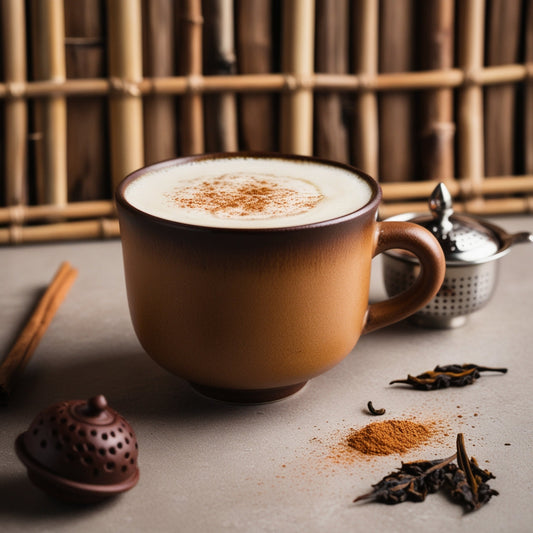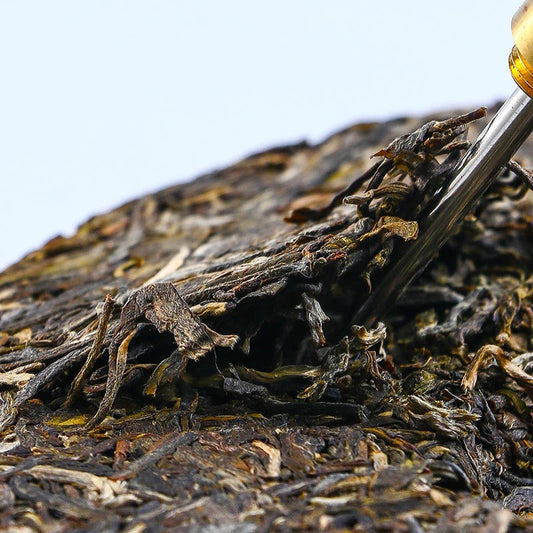Overview
Does Black Tea or Espresso has same caffeine?
Well both has caffeine but it is different. Both are well known bevarages. This article talks about black tea and it's caffeine content, espresso and it's caffeine, benefits and the risks. At last you will get to know which one to choose.
Table of Content
- Introduction
- Black Tea
- Espresso
- Caffeine
- Black Tea and Caffeine Benefits
- Espresso and Caffeine Benefits
- Black Tea and Caffeine Risks
- Espresso and Caffeine Risks
- Black Tea or Espresso Which One to Choose?
- Conclusion
Introduction
Black tea and espresso are two beloved beverages, each with its own unique flavours. While they both provide a boost of energy, they differ in caffeine content and health effects. Understanding these differences can help you make an informed choice about which drink best fits your lifestyle and preferences.
Black Tea
Black tea is made from the leaves of the Camellia sinensis plant. The leaves undergo full oxidation which results in a rich flavour and dark colour. Black tea is one of the most consumed teas globally and is known for its variety of health benefits. It contains antioxidants, which can help protect the body from damage caused by free radicals.
Caffeine Content in Black Tea
An 8-ounce cup of black tea typically contains about 40 to 70 mg of caffeine. The exact amount can vary depending on factors like the specific type of tea and how long it is brewed. For example, Assam black tea generally has higher caffeine levels than Darjeeling.

Espresso
Espresso is a concentrated coffee. it is a beverage made by forcing hot water through finely-ground coffee beans. It has a bold flavour and is usually served in small amounts. A single shot of espresso (about 1 ounce) typically contains around 63 mg of caffeine.
Espresso is popular not only for its strong taste but also for its potential health benefits. It contains antioxidants and can enhance mental focus and physical performance.
Caffeine Content in Espresso
While espresso is served in smaller servings, it has a much higher caffeine concentration than black tea. For instance, just one shot of espresso has around 63 mg of caffeine. This means that if you drink two cups of black tea, you might consume a similar amount of caffeine to a single shot of espresso.
Black Tea and Caffeine Benefits
Caffeine in black tea offers several benefits:
1. Increased Alertness:
The caffeine in black tea helps improve focus and alertness, making it a great choice for mornings or afternoons when you need a boost.
2. Mood Enhancement:
Caffeine can stimulate the release of dopamine, improving mood and reducing feelings of stress. This can be especially beneficial during a busy workday.
3. Antioxidant Properties:
Black tea contains flavonoids, which are antioxidants that helps to reduce oxidative stress in the body. Research shows that these antioxidants can improve heart health by reducing blood pressure and enhancing blood vessel function.
4. Hydration:
Moderate consumption of black tea can contribute to your daily fluid intake. Staying hydrated is essential for overall health, and enjoying a warm cup of tea can be a soothing way to do so.
5. Potential Weight Management:
Some studies suggest that the polyphenols in black tea may assist with weight management by promoting fat oxidation.
Espresso and Caffeine Benefits
Espresso also offers numerous benefits:
1. Quick Energy Boost:
With its concentrated caffeine content, espresso can provide a rapid energy boost, perfect for a quick pick-me-up. This is especially helpful during long work hours or before workouts.
2. Improved Physical Performance:
Studies show that caffeine can enhance athletic performance by increasing endurance and reducing perceived effort. A study found that caffeine consumption before exercise improved performance in endurance activities, making espresso a good choice for athletes.
3. Mental Focus:
The caffeine in espresso can enhance mental alertness and improve cognitive function. This makes it a favourite among students and professionals who need to concentrate.
4. Rich in Nutrients:
Espresso contains several vitamins and minerals, such as B vitamins, potassium, and riboflavin. These nutrients can contribute to overall health and well-being.
5. Potential Heart Health:
Some research suggests that moderate coffee consumption may lower the risk of heart disease. A study showed that people who consumed moderate amounts of coffee had a lower risk of heart-related issues. This indicates that espresso, when consumed in moderation, could also support heart health.
Black Tea and Caffeine Risks
While black tea has its benefits, excessive consumption can lead to some health risks:
1. Anxiety and Jitters:
Too much caffeine can lead to feelings of anxiety or jitteriness. Limiting intake can help prevent these effects, especially for those sensitive to caffeine.
2. Insomnia:
Drinking black tea too close to bedtime can interfere with sleep patterns. It’s best to enjoy it earlier in the day, allowing your body time to process the caffeine.
3. Digestive Issues:
Some people may experience stomach discomfort or acid reflux when consuming large amounts of black tea. Monitoring how your body reacts can help you enjoy it without discomfort.
4. Reduced Iron Absorption:
Tannins present in black tea can inhibit iron absorption, particularly from plant based sources. If you are prone to anemia, it may be wise to limit tea consumption during meals.
5. Dependency:
Regular consumption of caffeine can lead to dependence, resulting in withdrawal symptoms like headaches and fatigue when you cut back.
While black tea has its own benefits and side effects espresso also has some side effects too.
Espresso and Caffeine Risks
Espresso, while beneficial, also carries potential risks:
1. Increased Heart Rate:
High caffeine intake can lead to a rapid heartbeat, known as tachycardia. Moderation is key to avoid this condition.
2. Nervousness:
Similar to black tea, excessive caffeine can cause nervousness and anxiety. Be mindful of how much espresso you consume, especially if you have a history of anxiety.
3. Gastrointestinal Issues:
Some people may experience stomach upset or acid reflux due to the acidity of espresso. Monitoring your body's response is essential.
4. Disrupted Sleep Patterns:
Consuming espresso late in the day can interfere with your sleep cycle. Be cautious about when you enjoy your espresso to avoid sleepless nights.
When you look at all of the risks it’s all mainly happens due to the caffeine content and consuming it in high amounts. When you limit your intake you can avoid these risks and enjoy these two drinks. However, some people doubt that black tea is acidic. There are many doubts in between everyone. Additionally, try to keep in mind of limit and these risks before consuming any beverage.
Black Tea or Espresso Which One to Choose?
Deciding between black tea and espresso often comes down to personal preference and lifestyle. Here are some factors to consider:
1. Caffeine Sensitivity:
If you're sensitive to caffeine, black tea may be the better option since it typically has less caffeine than espresso. This can help you enjoy your beverage without experiencing jitters or anxiety.
2. Flavour Preference:
If you enjoy bold and rich flavours, you might lean towards espresso. If you prefer a lighter, more subtle taste, black tea could be your choice.
3. Health Goals:
Consider your health objectives. If you're looking for hydration and antioxidants, black tea is an excellent choice. If you want a quick energy boost, espresso might be more appealing.
4. Brewing Time:
Black tea usually requires a few minutes to steep, while espresso can be prepared in a matter of seconds. If you're in a hurry, espresso might be the way to go.
5. Variety of Options:
Black tea offers a wide range of flavours and varieties, from Earl Grey to English Breakfast. Espresso, too, has its variations, including lattes and cappuccinos, allowing for creative flavour combinations.

Conclusion
In conclusion, both black tea and espresso have unique benefits and risks associated with their caffeine content. Black tea offers a milder caffeine experience with additional antioxidants, while espresso provides a concentrated caffeine kick and rich flavour. Ultimately, the choice between the two depends on your taste preferences, caffeine sensitivity, and health goals.
Remember, moderation is crucial when it comes to caffeine consumption. Whether you choose black tea, espresso, or another beverage, enjoy it as part of a balanced lifestyle.
If you’re looking to explore more tea options, consider trying pu-erh tea. It offers unique flavours and potential health benefits, making it a fantastic addition to your beverage choices. You can find high-quality Pu-erh tea at Pu-erh Craft.
Q&A Section
Q1:Is Espresso Better than Black Tea?
A1: It depends on personal preference and what you seek in a beverage. Espresso offers a quick caffeine boost and a strong flavor, making it great for energy. In contrast, black tea provides a milder caffeine experience and added health benefits, such as antioxidants.
Q2: Does Espresso Give More Benefits?
A2: Espresso can provide faster energy and enhanced focus due to its concentrated caffeine content. However, black tea also offers unique benefits like heart health support and hydration, making it a nutritious choice for those looking for a gentler boost.
Q3: How much Caffeine Content in Black Tea and Espresso?
A3: An 8-ounce cup of black tea contains about 40 to 70 mg of caffeine, depending on the type and brewing time. A single shot of espresso has around 63 mg of caffeine, making it more concentrated but served in smaller amounts.






